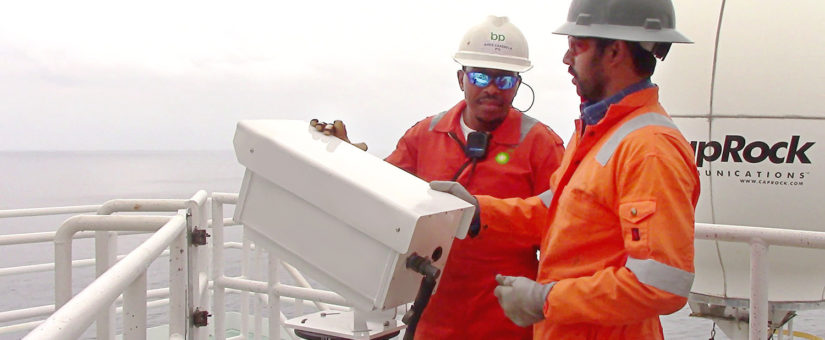
Spectral Imaging Tech Has a New Target: Helping the Energy Industry Monitor, Reduce Emissions
- On May 29, 2019 TAGS: BP, environmental monitoring, flaring, greenhouse gas emissions, infrared camera, LightShift, Multispectral imaging, snapshot spectral imaging
BP deploys advanced infrared camera that can support methane emissions management by monitoring emissions in real time
SAN DIEGO, Calif., May 31, 2019 – Surface Optics Corporation is part of an industry team behind an infrared (IR) camera that BP plc group businesses are using to manage methane emissions at oil and gas production facilities ranging from Alaska to Angola.
Those facilities use flaring – the controlled burning of gas during oil and gas production – to eliminate hydrocarbons that cannot be recovered or recycled. Some unburnt methane, the main component of natural gas and a potent greenhouse gas, can escape into the environment. It’s important to measure and manage these emissions, and the industry team’s video imaging spectral radiometry (VISR) flare monitor uses IR images to measure how efficiently the flare consumes emissions.
The VISR flare monitor is the first readily deployable monitoring solution that directly measures methane emissions entering the environment. BP has used the camera at production sites in Alaska and Angola and is dispatching them to four additional facilities this year.
“Inefficiencies in flaring is a potential source of methane entering the atmosphere,” said Peter Evans, BP Environmental Engineering Lead. “BP is determined to tackle such greenhouse gas emissions and help deliver a cleaner, better energy future. The VISR flare monitor enables us to do that, by helping us identify opportunities for real sustainable reductions in methane emissions.”
The VISR flare monitor is manufactured by a three-company team. Surface Optics developed the snapshot multispectral imaging technology that powers VISR. Responsible for the system-level hardware design, Surface Optics also manufactures the VISR camera, assembling the lens, spectral filters, IR sensor, camera housing, electronics, and performing system alignment and calibration. Lockheed Martin manufactures the IR sensor component at its Santa Barbara Focalplane facility in Calif., leveraging technology developed for advanced tactical fighter jets. Team lead Providence Photonics provides application expertise, software that analyzes the IR imagery and optimizes flare performance.
In addition to monitoring flare stacks, these cameras can help to continuously optimize combustion as part of a permanent system and maintain flare compliance with applicable regulations such as U.S. Environmental Protection Agency requirements. For example, increasing combustion efficiency from 96.5 to 98 percent yields a 40 percent reduction in hydrocarbon emissions.
About Surface Optics Corporation
Based in San Diego, Calif., Surface Optics Corporation designs and manufactures advanced imaging systems, vacuum coatings and surface engineering solutions for the world’s largest aerospace, defense, semiconductor, automotive, and energy companies.
About Providence Photonics
Located in Baton Rouge, La., Providence Photonics develops advanced technology in the field of optical gas imaging. It uses patented technology, computer vision techniques and IR single and multi-spectral imagers for such applications as leak qualification and survey validation, autonomous remote leak detection and flare combustion efficiency monitoring.
About Lockheed Martin
Headquartered in Bethesda, Maryland, Lockheed Martin is a global security and aerospace company that employs approximately 105,000 people worldwide and is principally engaged in the research, design, development, manufacture, integration and sustainment of advanced technology systems, products and services.
# # #
Media Contact:
Erin Dummer, +1-858-675-7404, erind@surfaceoptics.com



0 Comments